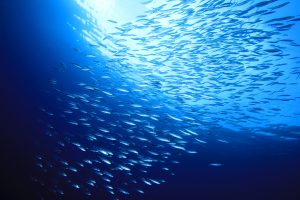 SEAFDEC and the ASEAN Member States (AMSs) made efforts on the sustainable utilization and management of fishery resources to ensure long-term food security in Southeast Asian region. Two regional initiatives in line with the ASEAN-SEAFDEC Resolution on Sustainable Fisheries for Food Security for the ASEAN Region Towards 2030 (RES&POA-2030) and UN Sustainable Development Goals (SDGs) had been successfully implemented. The first regional initiative was the stock assessment of neritic tunas, namely: kawakawa (KAW) and longtail tuna (LOT) which were carried out by the AMSs with technical support from SEAFDEC Training Department (TD) and Marine Fisheries Research and Development Department (MFRDMD). The stock assessment was done every 3–5 years since 2013 and the most recent assessment was conducted in 2018 using A Stock-Production model Incorporating Covariates (ASPIC), a tool commonly used by regional fisheries management organizations (RFMOs). KAW and LOT are considered as economically important transboundary fishery resources in the region. It was found that the stock status of the LOT in Southeast Asia is in healthy condition. On the other hand, the stock status of KAW in the Indian Ocean side has significantly worsened from 2014 to 2018 and slightly worsened from 2013 to 2018 in the Pacific Ocean side. The results of the assessment suggested that the concerned countries should consider reducing the current catch level of KAW.
SEAFDEC and the ASEAN Member States (AMSs) made efforts on the sustainable utilization and management of fishery resources to ensure long-term food security in Southeast Asian region. Two regional initiatives in line with the ASEAN-SEAFDEC Resolution on Sustainable Fisheries for Food Security for the ASEAN Region Towards 2030 (RES&POA-2030) and UN Sustainable Development Goals (SDGs) had been successfully implemented. The first regional initiative was the stock assessment of neritic tunas, namely: kawakawa (KAW) and longtail tuna (LOT) which were carried out by the AMSs with technical support from SEAFDEC Training Department (TD) and Marine Fisheries Research and Development Department (MFRDMD). The stock assessment was done every 3–5 years since 2013 and the most recent assessment was conducted in 2018 using A Stock-Production model Incorporating Covariates (ASPIC), a tool commonly used by regional fisheries management organizations (RFMOs). KAW and LOT are considered as economically important transboundary fishery resources in the region. It was found that the stock status of the LOT in Southeast Asia is in healthy condition. On the other hand, the stock status of KAW in the Indian Ocean side has significantly worsened from 2014 to 2018 and slightly worsened from 2013 to 2018 in the Pacific Ocean side. The results of the assessment suggested that the concerned countries should consider reducing the current catch level of KAW.
Another regional initiative is focused on Indo-Pacific mackerel (Rastrelliger brachysoma) which is an economically important transboundary fishery resource in the Gulf of Thailand (GoT). SEAFDEC in collaboration with the AMSs developed the Regional Action Plan for Management of Transboundary Species: Indo-Pacific Mackerel in the Gulf of Thailand Sub-region through a series of technical consultations and activities such as data collection, DNA studies, among others .The document serves as guide for concerned countries in implementing actions to achieve sustainable Indo-Pacific mackerel fisheries in the GoT sub-region by 2030 through science-based management . The provisions of the regional action plan were categorized within the context of ecosystem approach to fisheries management including governance, socioeconomic aspects, ecosystem, and climate change.
The abovementioned regional initiatives were adopted by the SEAFDEC Council during its 53rd Meeting in 2021 and recently noted by the Special SOM-42nd AMAF in August 2021.
 SEAFDEC Southeast Asian Fisheries Development Center
SEAFDEC Southeast Asian Fisheries Development Center